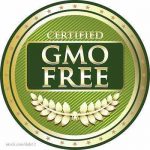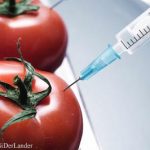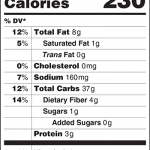Food and Water Watch has uncovered a new strategy by big food corporations to "label" foods as containing GMOs without, well, labeling them. Vermont's GMO labeling law is going into effect on July 1, 206. Corporations are now asking legislators to allow them to use their QR codes and 800 numbers as GMO labels. QR codes are those strange black and white squares on product packages that look like squiggles or writing from an ancient rune. You can scan them with a smartphone to get more information about the product or by directed to the company's website. In order to discover if a product contains genetically modified ingredients, you would have to scan the code, wait for a web page to load, and then see if there is any information about GMO ingredients. There are many problems with … [Read more...]
House of Representatives Passes DARK Act
Center for Food Safety is expressing "deep disappointment" that the Republican-controlled House of Representatives passed H.R. 1599, a bill that will not allow state and local governments to label and regulate genetically engineered foods. The bill codifies a voluntary labeling system approach, blocks the FDA from ever implementing mandatory GE food label, and would let food companies make misleading claims about how "natural" GE foods are. The bill is officially named The Safe and Accurate Food Labeling Act of 2015. But opponents have dubbed it Deny Americans the Right to Know (DARK) Act. Andrew Kimbrell, executive director of Center for Food Safety said in a statement, "passage of this bill is an attempt by Monsanto and its agribusiness cronies to crush the democratic … [Read more...]
Industry Appealing Court Decision Affirming GMO Labeling
Center for Food Safety says that the Grocery Manufacturers Association (GMA) is appealing the federal court decision made two weeks ago affirming the constitutionality of Vermont's GMO labeling law. Act 120 was signed into law in May of 2014. The state has declared that Act 120's GMO disclosure requirement is "reasonable related to the State's substantial interests, under Zauderer, Act 120s GE disclosure requirement is constitutional." The ruling also denied plaintiffs' motion for a preliminary injunction, granted the state of Vermont's Motion to Dismiss on several grounds, and ruled that plaintiffs were likely to prevail on Act 120's prohibition on labeling GE food as "natural". The law is scheduled to go into effect in July 2016. George Kimbrell, senior attorney at Center for Food … [Read more...]
DARK Act to Prevent GE Labeling Introduced to Congress
Representatives Mike Pompeo (R-KS) and G.K. Butterfield (D-NC) have introduced what opponents are calling the "DARK Act" to Congress. This bio would block both the FDA and individual states from requiring labels on GMO and GE foods. And it would also supplant mandatory disclosure with voluntary labeling standards. The Deny Americans the Right To Know (DARK) Act was debated in the House Agricultural Committee last week. Two committee members said that more diversity of opinion was needed on the bill before voting on it. The Act is called, ironically, the Safe and Accurate Food Labeling Act of 2015. Andrew Kimbrell, executive director of Center for Food Safety said in a statement, "This bill is simply not the solution Americans are looking for. An overwhelming majority of American … [Read more...]
Right to Know Files Emergency Lawsuit in Oregon GE Labeling Recount
According to the Center for Food Safety, Oregon citizens and Oregon Right to Know Campaign have filed an emergency lawsuit to ensure that their votes are properly counted in the recount of the Oregon GE labeling ballot measure. About 4,600 votes may be rejected. A mandatory statewide hand recount of Measure 92 is going on right now. The difference between "yes" and "no" was less than a tenth of a percentage point, or 812 votes. At this point, 4,600 ballots are being rejected without evidence of fraud or forgery. The lawsuit states, "these voters completed their ballots, signed their return identification envelopes pursuant to instructions provided by the Secretary of the State and local election officials, and timely returned their ballots. However, local election officials … have … [Read more...]
More Than 700 Chefs Tell Congress to Label GMOs
The Center for Food Safety reports that more than 700 chefs are telling members of Congress to mandate labeling of GMO foods. A petition was delivered on December 2, 2014 to advance legislation called the Genetically Engineered Food Right to Know Act sponsored by Senator Barbara Boxer (D-CA) and Representative Peter DeFazio (D-OR). The petition states, "as chefs, we know that choosing the right ingredients is an absolutely critical part of cooking. But when it comes to whether our ingredients contain genetically modified organisms, we're in the dark. It's time for Congress to move us forward, not backward, when it comes to our right to know what's in our food." The chefs who signed the petition include Art Smith, Tom Colicchio, Danielle Vogel, Andrea Reusing, and José … [Read more...]
Oregon GE Labeling Initiative Heads to a Recount
Measure 92, the genetically engineered (GE) food labeling initiative on the ballot this month is headed for a recount because it is too close to call. The gap between Yes and No is less than one tenth of a percentage point. Andrew Kimbrell, executive director of the Center for Food Safety said in a statement, "thanks to the tireless efforts of on the ground organizer, and despite an aggressive and expensive opposition campaign, GE food labeling is still alive in Oregon. Regardless of what happens next, this is only the beginning. The power and tenaciousness of the Food Movement has been on full display here in Oregon." Monsanto, DuPont Pioneer, Dow AgroSciences, Pepsi, and Coke together donated almost $15,000,000 to defeat the initiative. The previous record for spending on a ballot … [Read more...]
GMO Labeling Defeated in Elections; Slaughter Too Close to Call
Voters in Colorado defeated a GMO labeling initiative on the ballot last night, and it looks like Oregon's initiative will be defeated too, although the vote is very close. Even though labeling enjoys overwhelming support in opinion polls, that support will not translate into actual progress. The United States and Canada are the only major countries in the world that do not require labeling of genetically engineered foods. And the only microbiologist in Congress, Louise Slaughter, is ahead of her opponent by just a few hundred votes. Slaughter is a vocal supporter of food safety issues in the U.S. House. Rep. Slaughter is also a defender of medically important antibiotics and wants the FDA to restrict the sub therapeutic use of antibiotics in farm animals. GMO (genetically modified … [Read more...]
GMO Labeling on the Ballot in OR and CO
Ballot measures requiring all foods containing genetically modified organisms (GMOS) bear labels that say so will be decided by voters in Oregon and Colorado tomorrow. Proponents of these measures say consumers have the right to know which foods contain GMOs so they can make informed purchasing decisions. Critics say state laws regarding GMOs create problems for food manufacturers. In Vermont, which passed the first such law in May, the issue has landed in court. The Grocery Manufacturing Association (GMA), the Snack Foods Association, the International Dairy Foods Association and the National Association of Manufacturers filed suit in June to challenge the law set to go into effect July 1, 2016. “Vermont’s mandatory GMO labeling law – Act 120 – is a costly and misguided measure that … [Read more...]
Consumers Union: Cost of GE Food Labeling $2.30 Per Year
Consumers Union, the public policy and advocacy arm of Consumer Reports has estimated the cost of labeling GE foods and has released a report based on a literature review. They state that the median cost incurred by producers and retailers will be $2.30 per person per year; less than a penny a day. Labeling foods that contain genetically engineered (GE) or genetically modified (GMO) ingredients has been a contentious issue for years. Consumers and consumer groups want these food labeled so people can make an informed choice; polls show that more than 90% of consumers want these foods to be labeled. Industry generally opposes labeling, stating it would increase costs dramatically. Consumers Union asked ECONorthwest to resolve this disagreement. The studies reviewed include assessments … [Read more...]









